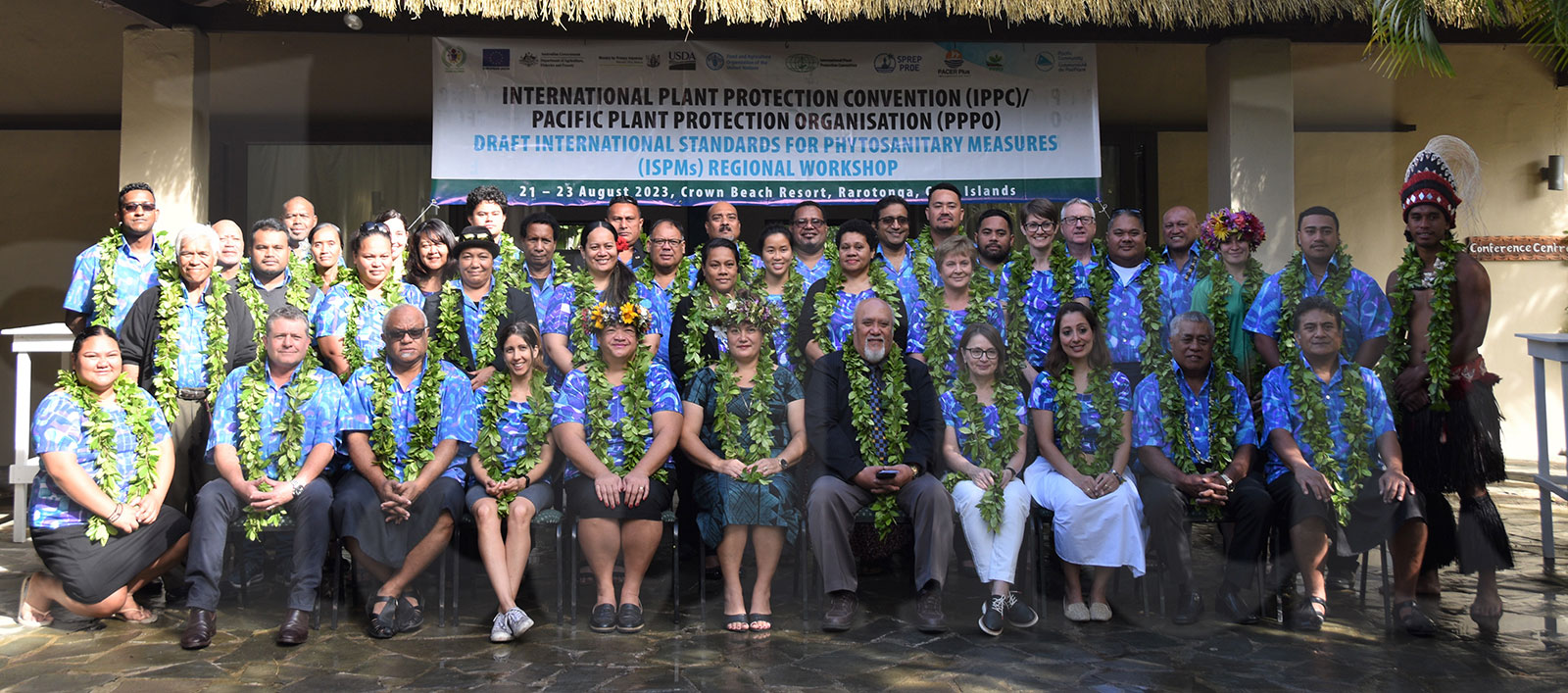Pacific Island countries meet in Rarotonga to discuss biosecurity and trade
Tuesday 22 August 2023 | Written by Melina Etches | Published in Economy, Environment, National, Pacific Islands, Regional

Participants at the Pacific Plant Protection Organisation (PPPO) and the International Plant Protection Convention (IPPC) workshop hosted at the Crown Beach Resort. MELINA ETCHES / 23082110
Over 40 participants from around the Pacific region are in Rarotonga for the Pacific Plant Protection Organization (PPPO) and the International Plant Protection Convention (IPPC) workshop, hosted at the Crown Beach Resort in Arorangi.
Secretary of Agriculture Temarama Anguna-Kamana said Rarotonga was originally scheduled to host the event in 2019, and they were pleased that the government had allowed them to host it this year.
It is also the Polynesian islands nations’ turn to be voted in at the election of the executive committee as PPPO chair.
“It is vital we bring this meeting here because we will be doing the election of the executive committee, and this year it’s the Polynesians’ turn,” Anguna-Kamana said. “We want the Cook Islands to put their hand up to be chair of the PPPO.”
The election will take place on Thursday night.
Acting chair of the PPPO, Nacanieli Waqa, said the event, which began yesterday, is a one-week engagement with two different meetings.
Waqa explained that the workshop is an annual event where they review international draft standards.
“As we know, standards have become part of our society, part of the world, and they are how trade is driven. So the international standard-setting body for plants and plant products is called the International Plant Protection Convention, and they are based in Rome. We in the Pacific are members of the convention.
“So every year, they develop draft standards that are sent to all the members for us to review to make sure they are relevant to us, especially the Pacific.”
Waqa said they would review the international standard and send it back to IPPC for adoption.
He further said that later this week they will have a regional technical board meeting.
“We usually meet every three years. The last meeting was in 2017, and then Covid came and further delayed the meeting. We are now grateful to our donors and partners, the New Zealand and Australian governments, the Secretariat of the Pacific Community (SPC), for the funding.
“The meeting is to set the direction for the region to protect it from biosecurity risks and work with countries to ensure we have a system that is allowed for improved facilitation of trade.”
The partners include the New Zealand Ministry of Primary Industries, Departments of Foreign Affairs and Trade, International Plant Protection Convention, the Food and Agriculture Organization of the United Nations, and PACER Plus.
The International Plant Protection Convention (IPPC) provides an international framework for plant protection that includes developing International Standards for Phytosanitary Measures (ISPMs) for safeguarding plant resources.
The standards, guidelines, and recommendations are recognized as the basis for phytosanitary measures applied by members of the World Trade Organization under the Agreement on the Application of Sanitary and Phytosanitary Measures.
They help achieve international harmonization of phytosanitary measures, with the aim to protect human health, unique flora, and fauna, and at the same time facilitate safe trade and avoid the use of unjustifiable measures as barriers to trade.
Minister of Agriculture Vainetutai Rose Toki-Brown says that from a global perspective, each year, an estimated 10-16 per cent of global harvest is lost to plant pests, equivalent to $220 billion per year.
The world’s population is currently growing at a rate of around 1.14 per cent annually, and the reality is that emergency situations will be increasingly faced, she says.
“Global food production must increase by 50 per cent to meet the projected demand of the world's population by 2050. However, the devastation effects from plant diseases can be far-reaching and alter the course of society and political history,” Minister Toki-Brown says.
“This reinforces the importance of international cooperation through the IPPC - it is absolutely crucial!
“That is why these three days of regional workshops and meetings are important for our respective Pacific Island Countries and Territories (PICTs) and the region as a whole.”














































